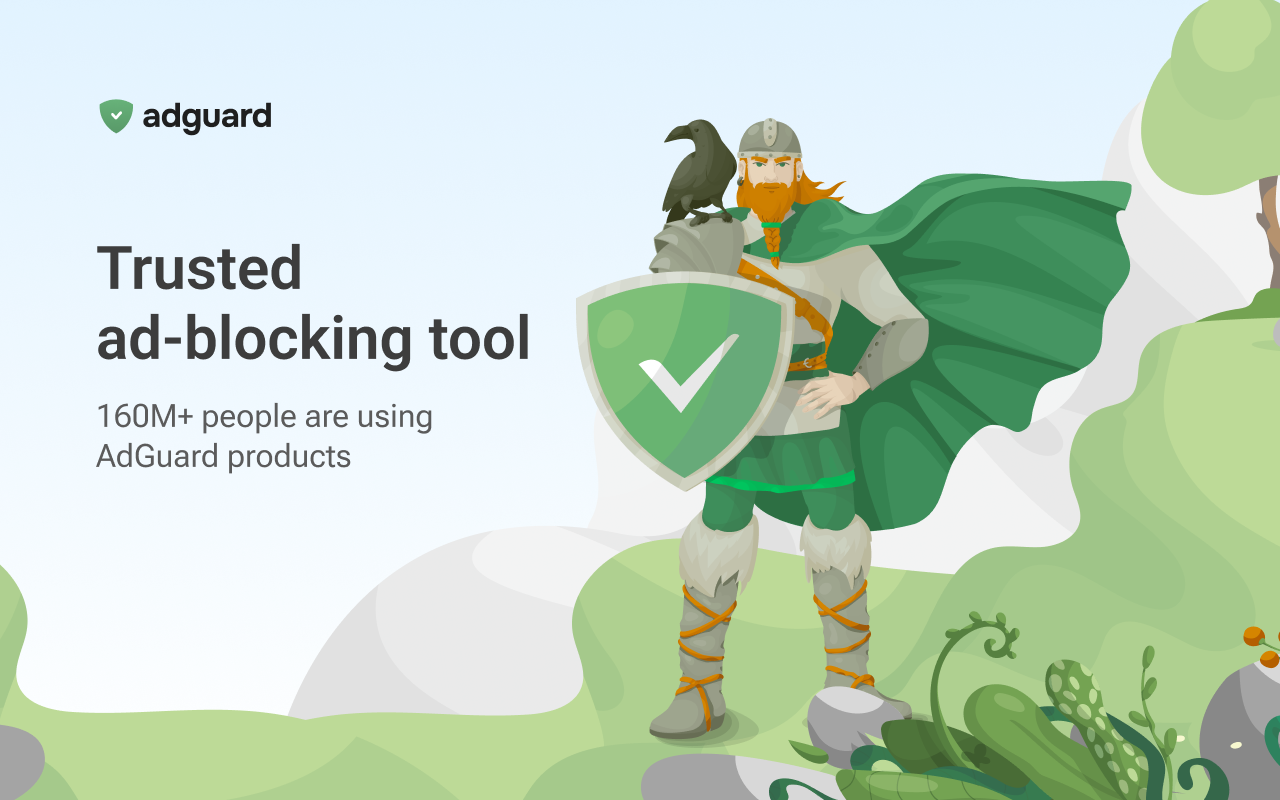In today's digital landscape, the question of whether to use ad-blockers has sparked a lively debate among internet users, digital marketers, and content creators alike. On one side, you have those who swear by ad-blockers like AdGuard, reveling in a cleaner browsing experience devoid of annoying pop-ups and auto-playing videos. On the other hand, there are voices advocating for the very ads that fuel free content across the web, arguing that using ad-blockers could undermine the livelihood of countless creators and websites. With both sides presenting compelling arguments, navigating this debate can feel like walking a tightrope — one misstep could tip the balance between enjoying an uncluttered online experience and supporting the free content we all rely on.
Understanding the nuances of this discussion is crucial for anyone who spends time online. After all, whether you're an avid online shopper, a tech-savvy individual, or a casual surfer, your choice regarding ad-blockers can impact not just your personal browsing habits but also the broader digital ecosystem. So, should you take the plunge and install an ad-blocker like AdGuard? Or should you embrace the ads in exchange for access to a wealth of free resources? In this article, we’ll dive deep into the pros and cons of using ad-blockers, explore their effects on digital marketing, and even consider alternative advertising methods that are gaining traction. Buckle up as we unpack this great debate!
What Are Ad-Blockers?
Ad-blockers are browser extensions or software applications designed to prevent advertisements from appearing on web pages. Tools like AdGuard work by filtering out unwanted content, allowing users to browse the internet without interruptions from intrusive ads, pop-ups, and banners. They essentially act as gatekeepers, ensuring a smoother user experience by blocking digital advertising that can slow down page loading times or distract from the content users actually want to see. Whether you're scrolling through social media, watching videos, or reading articles, an ad-blocker helps create a more enjoyable browsing environment.
The popularity of ad-blockers has surged in recent years. According to recent studies, nearly one in four internet users globally now employs some form of ad-blocking technology. This trend is particularly prominent among younger demographics who are more tech-savvy and often frustrated by the aggressive nature of online ads. For instance, a survey showed that 63% of millennials use ad-blockers primarily to avoid distractions while consuming content online. With the rise of mobile browsing and video streaming, the demand for tools that enhance user experience continues to grow, prompting many users to ask themselves, "Should I use an ad-blocker like AdGuard?"
Interestingly, the effectiveness of ad-blockers extends beyond just removing ads; they also contribute to improved browsing speeds. By eliminating the need for browsers to load numerous ads, users can enjoy faster page loads and less data usage, which is particularly beneficial for those with limited internet plans. As a result, not only do ad-blockers enhance user experience by decluttering web pages, but they also empower users to take control over their online interactions and make the web feel more personal and less commercial.
As digital advertising continues to evolve, the widespread adoption of ad-blockers poses significant challenges for advertisers and content creators. With a growing number of users opting for ad-free experiences, marketers must rethink their strategies and find innovative ways to reach their audiences without compromising user experience. Understanding what ad-blockers are and how they function is crucial for anyone navigating the digital landscape — whether you're an everyday user looking to streamline your browsing or a marketer trying to adapt to changing consumer behaviors.
Pros of Using Ad-Blockers
Imagine scrolling through your favorite blog or catching up on the latest tech news, only to be bombarded by flashy pop-ups and auto-playing video ads that disrupt your reading experience. This is where ad-blockers come into play, providing a cleaner and more enjoyable browsing environment. By filtering out intrusive ads, tools like AdGuard allow you to focus on the content that truly matters to you. For many users, this enhanced browsing experience is reason enough to install an ad-blocker, making it easier to sift through information without distraction.
Another significant benefit of using ad-blockers is the noticeable increase in page load speed and overall website performance. Websites laden with heavy advertisements often take longer to load, frustrating users who are eager for quick access to their desired content. According to various studies, sites that utilize ad-blockers can see an improvement in loading times by up to 50%. This not only enhances user satisfaction but also encourages people to visit and revisit sites that provide a seamless experience — after all, who wants to wait around while ads are loading?
Beyond just speed and ease of use, ad-blockers also offer a layer of protection against potential security risks associated with intrusive ads. Some ads may contain malware or lead users to phishing sites, putting personal data at risk. By using an ad-blocker, users can significantly reduce their exposure to these threats, ensuring a safer online experience. It's like having a digital bouncer that keeps unwanted guests out of your online space, allowing you to browse with peace of mind.
However, it’s essential to recognize that while these advantages enhance individual user experiences, they come with implications for content creators and website revenue. Many websites rely heavily on advertising income to sustain their operations and produce free content. While ad-blockers provide undeniable benefits for users, the balance between enjoying a distraction-free experience and supporting creators remains a vital aspect of this ongoing debate.
Cons of Using Ad-Blockers
While ad-blockers like AdGuard can significantly enhance your online experience, they come with their own set of drawbacks that are worth considering. One of the most pressing concerns is the impact on content creators and websites that depend heavily on ad revenue to operate. Imagine a small blog that provides valuable insights or a YouTube channel producing high-quality content. These creators often rely on the income generated from ads to continue their work. When users employ ad-blockers, it effectively cuts off that revenue stream, potentially leading to the closure of these platforms. As a result, the diversity of content available online could diminish, leaving users with fewer choices.
Moreover, using ad-blockers can lead to a potential loss of access to free content and services. Many websites offer their articles, videos, and other resources for free because they monetize through advertising. If a significant number of users block these ads, sites may be forced to implement paywalls or subscription models. This shift could mean that valuable information becomes locked behind a paywall, making it less accessible to those who cannot afford it. For instance, popular news outlets may start charging for their articles if ad revenue declines sharply due to widespread ad-blocker use. The convenience of free content could quickly become a luxury.
Lastly, there are ethical considerations surrounding online advertising that are often overlooked in the ad-blocker debate. While it's easy to view ads as mere annoyances, they serve an essential function in the digital economy. They allow businesses to promote their products and services while giving creators a chance to earn money for their work. By blocking ads, users might inadvertently support a culture of entitlement where free content is expected without consideration for how it’s funded. It raises a thought-provoking question: should I use an ad-blocker like AdGuard if it means jeopardizing the livelihood of creators and the availability of free resources? Balancing personal privacy protection with support for content creators is crucial in navigating this complex digital landscape.
How Ad-Blockers Affect Digital Marketing
The rise of ad-blockers has significantly reshaped the landscape for advertisers and digital marketers. As more users opt for tools that enhance their browsing speed and minimize internet distractions, traditional advertising methods are being challenged like never before. Advertisers are finding it increasingly difficult to reach audiences through conventional banners and pop-ups, leading to a reevaluation of marketing strategies. For example, studies indicate that nearly 30% of internet users employ ad-blockers, which means a substantial portion of potential impressions and clicks are vanishing into thin air. This reality forces brands to rethink how they engage with consumers.
In response to the growing prevalence of ad-blockers, many companies are pivoting towards alternative monetization methods. Subscription models, where users pay for an ad-free experience or premium content, are becoming more popular. Platforms like Spotify and YouTube Premium have successfully capitalized on this trend, allowing users to enjoy their favorite music and videos without interruptions. Similarly, brands are exploring native advertising, which seamlessly integrates promotional content within the context of a platform — think sponsored articles or social media posts that feel organic rather than intrusive. This approach not only circumvents ad-blockers but also enhances user engagement by providing value rather than disruption.
Moreover, marketers are actively developing ad-blocker detection strategies to understand their audience better and mitigate losses. Tools that identify when a user is employing an ad-blocker allow marketers to adapt their approach in real-time. For instance, some websites now prompt users to disable their ad-blockers or even offer incentives, such as exclusive content or discounts, in exchange for whitelisting. This not only fosters a sense of community but also encourages users to consider the impact of their ad-blocking habits on the creators and businesses they enjoy.
As the digital advertising landscape continues to evolve, understanding the implications of ad-blockers will be crucial for both marketers and users. Balancing effective marketing strategies while respecting user preferences will be key to navigating this complex environment. With ongoing developments in technology and changing consumer attitudes, the future of digital marketing will likely rely on innovative solutions that prioritize user experience while still delivering valuable advertising.
Alternatives to Traditional Advertising
As the ad-blocking movement gains momentum, content creators and marketers are forced to rethink their strategies. One promising alternative is the subscription model, which allows users to access premium content without the interruption of ads. Platforms like Spotify and Netflix have successfully implemented this approach, offering ad-free experiences in exchange for a monthly fee. This model not only fosters a more enjoyable user experience but also provides a reliable revenue stream for creators. As users become increasingly willing to pay for quality content, it begs the question: should I use an ad-blocker like AdGuard if I can support creators directly through subscriptions?
Another avenue gaining traction is native advertising and influencer partnerships. Instead of traditional banner ads that often get ignored or blocked, native ads blend seamlessly into the content users are already engaging with. For example, a well-placed sponsored post on social media can provide value while still promoting a product or service. Influencers, who have cultivated trust with their audiences, are also becoming key players in this space. Brands are collaborating with them to create authentic, relatable content that resonates with consumers. This approach not only enhances brand visibility but also respects the audience’s desire for less intrusive advertising.
Lastly, there's a growing emphasis on ethical advertising practices. As consumers become more aware of how their data is used and how ads affect their online experience, brands are stepping up to adopt transparent and responsible advertising methods. Companies like Patagonia exemplify this shift by focusing on sustainability and social responsibility in their marketing efforts. They not only promote their products but also advocate for environmental causes, thereby connecting with consumers on shared values. This not only builds brand loyalty but also encourages a healthier relationship between consumers and advertisers.
In light of these evolving trends, it's clear that there are numerous alternatives to traditional advertising that can mitigate the impact of ad-blockers. Whether through subscription models, native advertising, or ethical practices, brands and content creators have the opportunity to innovate and thrive in this changing landscape. So, if you're contemplating whether to use an ad-blocker like AdGuard, consider how these alternatives might enhance your browsing experience while still supporting the creators you love.
User Perspectives on Ad-Blockers
As the debate around ad-blockers heats up, it's essential to consider the voices of everyday internet users who navigate this digital landscape. Many users turn to ad-blockers like AdGuard primarily for an enhanced browsing experience. For instance, Sarah, a college student and avid online shopper, shared her frustration with intrusive pop-ups that often interrupted her search for deals. “I just want to look at shoes without being bombarded by ads,” she said. Her experience reflects a common sentiment: users appreciate a cleaner interface that allows them to focus on content rather than distractions.
However, many users also grapple with the ethical implications of using ad-blockers. While they enjoy an ad-free experience, there's a growing awareness of the impact these tools have on content creators and websites that rely on advertising revenue. Mark, a freelance journalist, explained his dilemma: “I use an ad-blocker because I can’t stand annoying ads, but I also feel guilty knowing that my favorite blogs might struggle to stay afloat without ad support.” This internal conflict highlights the balancing act many users face — seeking a better experience while wanting to support the creators they love.
Case studies further illustrate this tension. For example, after switching to an ad-blocker, Jessica, a tech enthusiast, noticed she felt liberated from constant marketing pressures. However, she soon discovered that some of her favorite tech review sites had started implementing paywalls as a direct response to ad-block usage. This shift forced her to reconsider her stance: “I didn’t realize how much my choices impacted the creators I follow,” she reflected. Ultimately, Jessica decided to whitelist certain sites that provided valuable content, showcasing a nuanced approach many users are adopting — using ad-blockers judiciously while still supporting creators when they can.
In summary, user perspectives on ad-blockers reveal a complex web of motivations and ethical considerations. While they enhance the browsing experience and mitigate annoyance from invasive ads, users are increasingly aware of their potential consequences on the digital ecosystem. As this debate continues, it’s clear that finding common ground between user satisfaction and supporting content creators is more important than ever.
The Future of Ad-Blocking Technology
As we look ahead, the landscape of ad-blocking technology is poised for significant evolution. Developers are constantly refining their software to not only block intrusive ads but also to enhance user privacy and security. For instance, many modern ad-blockers now incorporate features that protect against tracking cookies and phishing attempts. This means that when you ask yourself, “Should I use an ad-blocker like AdGuard?” you're not just considering an ad-free experience; you're also opting for a safer browsing environment. As the demand for online privacy grows, we can expect ad-blockers to continue evolving into comprehensive security tools.
The digital advertising ecosystem is also undergoing a transformation in response to the rise of ad-blockers. With more users choosing to block ads, companies are being pushed to innovate their marketing strategies. We may see a shift towards more ethical advertising practices, such as native ads that blend seamlessly with content or influencer partnerships that provide authentic engagement without feeling intrusive. Moreover, businesses might explore subscription models or premium content access, providing users with options that respect their preferences while still generating revenue.
Regulatory changes are another factor shaping the future of ad-blocking practices. Governments and organizations worldwide are beginning to scrutinize online advertising methods, with some even proposing regulations that enforce transparency in how ads are served and tracked. This could lead to a scenario where ad-blockers are not just tools for users but also part of a larger compliance framework for businesses. As policies evolve, both advertisers and consumers will need to adapt, creating a dynamic interplay that could redefine how we think about digital marketing and user experience.
In summary, as we contemplate whether to use an ad-blocker like AdGuard, it's crucial to recognize the broader implications of this choice. The future of ad-blocking technology is intertwined with advancements in user privacy, shifts in marketing strategies, and evolving regulatory landscapes. As these elements converge, the way we interact with digital content — and the ads that accompany it — will continue to change, making this debate more relevant than ever.
Wrapping It Up: Should You Use an Ad-Blocker?
In this digital age, the debate surrounding ad-blockers like AdGuard is more relevant than ever. We’ve explored the ins and outs of ad-blockers, from how they enhance your browsing experience by cutting down on distractions and speeding up page loads, to the potential downsides they pose for content creators who rely on ad revenue. It’s clear that while ad-blockers can provide a smoother online experience, they also come with ethical considerations and consequences for the free content you enjoy every day.
So, should you use an ad-blocker like AdGuard? Ultimately, the decision comes down to your individual needs and values. If you prioritize a cleaner, faster browsing experience and want to protect yourself from intrusive ads, then an ad-blocker might be the way to go. However, if you’re passionate about supporting the creators and websites you love, you may want to consider alternative approaches like whitelisting sites or exploring subscription options. Take some time to weigh the pros and cons — your online experience is in your hands!



